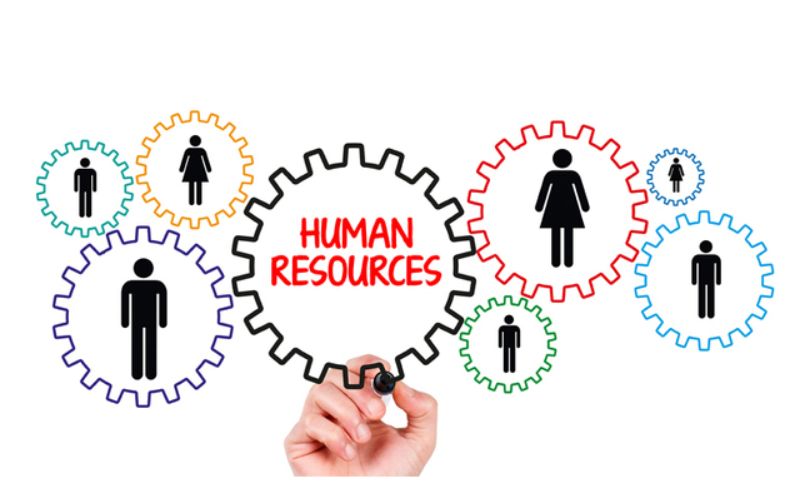For each enterprise, the human factor is always a crucial element to facilitate an enterprise in operating and doing business efficiently. Therefore, human resource management is an important field that requires individuals working in this area to have a certain understanding of the specific nature of the enterprise, possess skills to connect employees with theenterprise, and comprehend relevant legal regulations. So, what is human resource management, and does the perspective that “Human resource management – The foundation for sustainable development of every enterprise” accurate or not?
What is Human Resources Management?
Human resource management is the process of harnessing and utilising the workforce of an organisation or an enterprise with the main goal of effectively managing and developing human resources, minimising resource waste, thereby aiming for the growth and success of the enterprise. In the current context, the management of people and human resource management is a critical field that plays an essential role in managing, utilising, and developing the workforce within organisations and enterprises.
Why Human Resource Management is the foundation for sustainable development of every enterprise?
To answer the question “Why human resource management is the foundation of sustainable development for every enterprise”, this article will analyse based on the prominent functional groups of human resource management.
Attracting Human Resources:
Human resource management plays a crucial role in planning and recruiting employees to ensure both the quantity and quality of the workforce, adhering to appropriate criteria of “right person, right job” within the enterprise.
Those working in the field of human resource management need to perform work analysis, thereby indicating how many employees that the enterprise needs to recruit and the standards set for each candidate. Effective application skills such as forecasting, workforce planning, analysis, interviewing, collecting, storing, and processing information about human resources will reflect the level of effectiveness in attracting personnel for the enterprise.
Training and development of human resources:
Human resource management focuses on enhancing the professional capacity of employees, ensuring that employees in the enterprise possess the necessary skills and professional qualifications to perform their assigned tasks well, also creates conditions for employees to develop their maximum personal potential.
When an enterprise undergoes any changes in production needs, busines operations, or expands its developmental scale, the training and creation of flexible personnel coordination plans become a clear evidence that the enterprise is applying Human Resource Management functions to its business operations.
Retaining human resources:
This function is regarded as one of the core functions of human resource management activities, as it focuses on maintaining and efficiently utilising the workforce within the enterprise. Retaining human resources involves those activities such as
- Motivating and encouraging employees reflected through salary and compensation policies, promotions, allowances, bonuses, and periodic performance evaluations.
- Sustaining and developing good, long-term, and stable labour relations demonstrated through activities such as contract negotiations, resolving labour disputes, handling disciplinary matters, improving the work environment, addressing health and safety concerns, and managing benefits, insurance, and occupational safety, etc.
An enterprise that effectively addresses this function will serve as a foundation for them to promote the growth and development of the company as well as foster good and sustainable relationships within the enterprise. This contributes to building strong and sustainable relationships between the enterprise and its employees, minimising the likelihood of disputes within the enterprise.

Legal regulations affecting human resource management in enterprise?
Regulations regarding labour contracts and the establishment of internal regulation, democratic rules applicable to employees
Labour contracts, internal labour regulations, democratic rules and collective labour agreements are generally considered as the comprehensive forms of regulations that have been established and legalised within an enterprise. They distinctly and truthfully reflect the overall picture of Human Resource Management in an enterprise.
Based on Article 13 of the Labour Code 2019, a labour contract is an agreement between the employee and the enterprise, encompassing provisions related to working hours, salary, contract duration, social insurance, working conditions, rights and obligations of both parties, and other agreements. Meanwhile, those documents such as labour regulations, collective labour agreements, democratic regulations, etc., are documents that enterprises construct and issue after obtaining the opinions of labour representatives at the grassroots level (trade unions and organisations of workers in the enterprise). These documents establish internal regulations and policies of the enterprise that directly impact the rights and obligations of employees within the enterprise, in addition to the labour contracts. However, it is important to note that the content of these legal documents must comply with labour laws and regulations.
A well-managed human resource in an enterprise will have policies and terms of employment that make employees feel satisfied and willing to contribute their capabilities, thereby enhancing business efficiency.
Regulations regarding training, development, and skill enhancement
According to Article 60 of the Labour Code 2019, enterprises are responsible for establishing plans for training, development, and skill enhancement for their employees. Examined from human resource management perspectives, this activity is considered both an employee’s right and an enterprise’s responsibility to train and improve the skills of employees workforce, ensuring they have sufficient professional knowledge and job-related skills. Additionally, the establishment and organisation of training programs for employees are seen as a policy to attract labour and guarantee a high-quality workforce to actively support for the business activities.
Salary and Bonus System; Insurance Regulations:
Salary, bonus, and insurance policies are the most crucial perks that employees are concerned about when choosing a work unit because they play a decisive role in determining the level of attachment and retention of potential, high-quality resources.
- Salary and bonus regime:
Based on Articles 90 and 104 of the Labour Code 2019, salary and bonuses are outcomes resulting from an employee’s labour process. These also serve as a tool for enterprises to create binding, managerial, supervisory, and evaluative mechanisms for the capabilities of their workforce.
The outcome of Human Resource Management activities in this matter will directly impact the responsibility capacity, work quality, and efforts of employees in contributing to the successful progress of an enterprise.
- Insurance regulations
Based on Article 168 of the Labour Code 2019, the mandatory participation of employers in social insurance, health insurance, and unemployment insurance is to ensure protection against potential labour risks for their workforce. The insurance system serves as a mechanism to safeguard the rights and benefits of human resources within a business, reflecting a forward-looking perspective and concern for employee welfare, contributes to enhancing the reputation, brand, and motivation of the workforce within an enterprise.
Handling of Labour Disciplinary Actions, Resolution of Labour Disputes:
Handling labour disciplinary actions serves as a mechanism for discipline and is a legal framework defining the scope of implementation for employees within the enterprise. On the other hand, labour disputes are the sensitive issue that can arise in any enterprise. Resolving a labour dispute within an enterprise reflects the fairness, objectsivity, and credibility of an enterprise.
For this issue, to have a reasonable basis for making decisions regarding the handling of labour disciplinary actions and the resolution of labour disputes, enterprises need to establish their specific, clear, and consistent labour regulations that do not contradict labour laws and related regulations[1].
Recommendations for Human Resource Management
Based on the above analyses, here are some recommendations for businesses to build a robust and increasingly developing resource management system:
- First and foremost, establish a robust management framework, covering recruitment processes, training, labour management, and supervision. However, it is essential to ensure the freedom, privacy, and comfort of employees within the enterprise. To achieve this, managers within the enterprise must cultivate leadership skills, stay updated on human resource management trends in successful businesses, listen to the employees, and empathise with their perspectives.
- Secondly, invest in welfare policies and treatment for employees who working for the enterprise. Human resources are the cornerstone of any enterprise. Therefore, investing in benefits for this crucial resource is the key to success and comprehensive human resource management for any enterprise Building a good treatment policy will help the enterprise minimise the costs of recruiting new employees, effectively retain talented individuals, and establish a strong bond between employees and the enterprise.
- Thirdly, enterprise should establish mechanisms to evaluate job performance, create challenging scales to promote competition, and stimulate employees to excel. Human resource management becomes truly effective when it meets quality criteria in business operations from the enterprise’s perspective while also addressing material and spiritual needs from the employees’ perspective.

The above is an overview of our legal perspective on Human Resource Management – The foundation for sustainable development of every enterprise matter that Phuoc & Partners share with readers. If you have difficulties in finding a Law Firm to advise and support in the relevant legal field, please contact us. Phuoc & Partners is a professional consulting firm established in Vietnam and currently has nearly 100 members working in three offices in Ho Chi Minh City, Hanoi and Danang. Phuoc & Partners is also rated as one of the leading consulting firms specialising in business law in Vietnam that has leading practice areas in the legal market such as Labour and Employment, Taxation, Merger and acquisition, Litigation. We are confident in providing Clients with optimal and effective service.
[1] Article 118.2 of the Labour Code 2019

